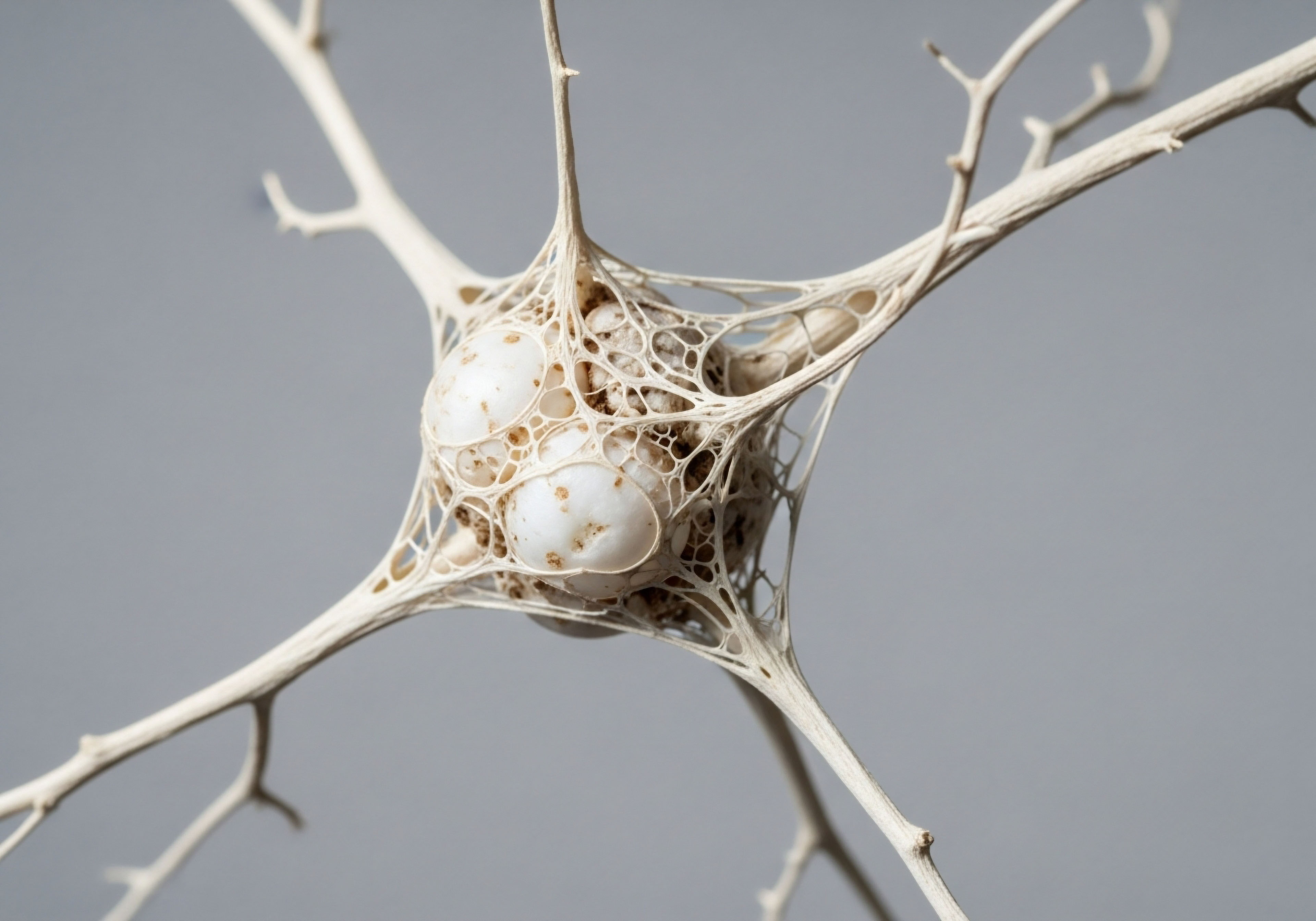

The Biological Imperative for Internal Harmony
Your body is a complex, interconnected chemical system, a masterful arrangement of hormones and neurotransmitters that dictate everything from your cognitive acuity to your physical resilience. Understanding this internal chemical landscape is not merely an academic pursuit; it is the foundational requirement for unlocking sustained peak performance and true vitality.
The endocrine system, a network of glands producing hormones, acts as the director of this arrangement, directing essential biological processes that underpin health, mood, energy, and longevity. When these signals are precisely tuned, the result is a state of optimal function. When they fall out of sync, the performance falters, leading to diminished capacity and a cascade of suboptimal outcomes.
The rationale for engaging with your internal chemistry is deeply rooted in evolutionary biology and modern physiology. Hormones like testosterone, estrogen, progesterone, thyroid hormones, growth hormone, and cortisol are not mere biological byproducts; they are potent signaling molecules that govern cellular function, metabolism, mood regulation, immune response, and tissue repair.
Each plays a critical role in maintaining homeostasis and facilitating adaptation to environmental demands. The decline or dysregulation of these vital messengers with age, or due to lifestyle factors, directly impacts an individual’s capacity to perform at their highest level. Reclaiming control over these signals means reclaiming control over your biological destiny.

The Pillars of Physiological Command

Cognitive Sharpness and Neurochemical Balance
The brain, the command center of your existence, is profoundly influenced by the hormonal milieu. Neurotransmitters and hormones work in concert to regulate mood, focus, memory, and motivation. For instance, testosterone’s influence extends beyond musculature; it plays a significant role in cognitive function, spatial reasoning, and mood stability in both men and women.
Estrogen is critical for neuronal health and cognitive processes, particularly in areas related to memory and verbal fluency. Optimizing these hormones directly supports a robust cognitive architecture, essential for complex problem-solving and sustained mental output.

Metabolic Efficiency and Energy Dynamics
Your body’s ability to efficiently convert food into usable energy, and to manage energy stores, is largely dictated by hormones like insulin, thyroid hormones, and growth hormone. Thyroid hormones, for example, regulate your basal metabolic rate, influencing how quickly your cells burn fuel. Growth hormone plays a role in fat metabolism and muscle preservation.
Imbalances here can lead to sluggishness, stubborn body fat, and a compromised energy reserve, directly hindering physical performance and daily vitality. Achieving metabolic harmony through hormonal balance is key to sustained energy and optimal body composition.

Physical Resilience and Tissue Regeneration
The maintenance and repair of muscle tissue, bone density, and connective tissues are heavily dependent on anabolic hormones such as testosterone and growth hormone. Testosterone supports protein synthesis, crucial for muscle growth and repair after physical exertion. Growth hormone stimulates cell reproduction and regeneration, aiding in recovery and tissue maintenance.
When these anabolic signals are suboptimal, recovery times lengthen, the risk of injury increases, and the capacity for physical adaptation diminishes. A well-tuned hormonal system ensures your physical structure can withstand and recover from the demands placed upon it.

Emotional Equilibrium and Stress Response
The delicate balance of mood and emotional regulation is intrinsically linked to hormonal status, particularly cortisol and sex hormones. Chronic stress elevates cortisol, which can disrupt sleep, impair cognitive function, and negatively affect mood. Adequate levels of sex hormones contribute to a sense of well-being and emotional stability. Mastering your mind’s chemical system involves understanding how these hormones interact to create a resilient emotional state, allowing you to navigate challenges with composure and clarity.
The endocrine system is the master director of your body’s internal system, with hormones serving as precise signals that dictate every facet of physiological and cognitive performance.


Orchestrating Your Endocrine Ensemble
Achieving command over your body’s chemical system requires a systematic, data-driven approach to understanding and modulating your endocrine system. This is not about guesswork; it is about precision engineering, informed by extensive diagnostics and evidence-based therapeutic strategies. The first step involves a deep dive into your unique biological blueprint, identifying specific hormonal patterns and deficiencies that may be hindering your optimal state.

Diagnostic Precision ∞ Reading the Biochemical Score

Comprehensive Biomarker Analysis
The cornerstone of hormonal optimization is accurate, extensive testing. It involves assessing a full spectrum of hormones, including total and free testosterone, estradiol, progesterone, DHEA-S, cortisol (diurnal patterns), thyroid panel (TSH, Free T3, Free T4, antibodies), and growth hormone markers like IGF-1. Understanding these baseline levels provides the essential data for developing a personalized strategy. It reveals where the arrangement is playing out of tune.

Understanding Hormone Kinetics and Dynamics
Hormone levels fluctuate throughout the day and across the menstrual cycle. Therefore, the timing of blood draws is critical. For example, cortisol is typically highest in the morning and lowest at night, reflecting diurnal rhythms. Testosterone levels can also vary. Advanced diagnostics may include salivary hormone testing for diurnal cortisol patterns or understanding LH/FSH for gonadal axis function. This detailed understanding ensures interventions are targeted precisely where and when they are most effective.

Therapeutic Modalities ∞ Tuning the Instruments

Hormone Replacement Therapy (HRT) and Optimization
For individuals with clinically significant hormone deficiencies or age-related decline, Hormone Replacement Therapy (HRT) or more accurately, Hormone Optimization Therapy (HOT), represents a powerful tool. This can include Testosterone Replacement Therapy (TRT) for men and women, estrogen and progesterone therapy for women, and potentially DHEA or pregnenolone supplementation.
These therapies aim to restore hormone levels to optimal physiological ranges, thereby correcting deficiencies and mitigating associated symptoms. The delivery methods are diverse, including injections, transdermal creams, gels, and pellets, each with unique pharmacokinetic profiles.

The Precision of Peptide Therapy
Peptides are short chains of amino acids that act as signaling molecules, influencing a vast array of biological processes. In the context of vitality and performance, specific peptides offer targeted benefits.
- Growth Hormone Releasing Peptides (GHRPs) and Growth Hormone Releasing Hormones (GHRHs) like CJC-1295 and Ipamorelin stimulate the pituitary gland to release growth hormone, supporting muscle repair, fat loss, and cellular regeneration.
- Peptides like BPC-157 and TB-500 are known for their potent tissue healing and anti-inflammatory properties, crucial for recovery and injury management.
- Others, such as Melanotan II, influence melanocortin receptors, impacting skin pigmentation, libido, and appetite, though its use requires careful consideration due to potential side effects.
Peptide therapy offers a highly specific approach to influencing biological pathways, often with a favorable safety profile when administered correctly and sourced reliably.

Lifestyle as the Master Director’s Baton
While pharmaceutical and peptide interventions are potent, they are most effective when integrated with foundational lifestyle practices. These act as the director’s guiding hand, ensuring the entire system performs in harmony.
- Nutrition: A nutrient-dense diet rich in healthy fats, quality proteins, and complex carbohydrates provides the raw materials for hormone synthesis and cellular function. Macronutrient timing and micronutrient sufficiency are paramount.
- Sleep: Deep, restorative sleep is when crucial hormonal processes, including growth hormone release and cortisol regulation, occur. Prioritizing 7-9 hours of quality sleep is non-negotiable.
- Exercise: Strategic resistance training stimulates anabolic hormone production and improves insulin sensitivity. Cardiovascular exercise enhances metabolic health and mitochondrial function.
- Stress Management: Chronic stress dysregulates cortisol and other hormones. Implementing mindfulness, meditation, or other stress-reduction techniques is vital for hormonal balance.
Peptide therapy represents a sophisticated frontier in biological optimization, enabling targeted signaling to specific cellular pathways for enhanced performance and recovery.


Chronos and the Optimized Self
The question of “when” to engage with the command of your chemical system is as critical as the “why” and “how.” This involves understanding the natural rhythms of the body, recognizing the signs of biological aging and dysregulation, and strategically timing interventions for maximum benefit and minimal disruption. It is about aligning your actions with the body’s intrinsic chronobiology.

Recognizing the Signals ∞ The Body’s Call to Action

Age-Related Hormonal Shifts
As individuals progress through life, a natural decline in hormone production occurs. This is not an inevitable pathology to be passively accepted, but a physiological shift that can be understood and managed. For men, testosterone levels typically begin a gradual decline after age 30.
For women, perimenopause and menopause mark significant hormonal transitions, with a sharp decrease in estrogen and progesterone. These changes can manifest as decreased energy, altered mood, changes in body composition, and cognitive fog. Recognizing these shifts is the first step toward proactive management.

Performance Plateaus and Bio-Indication
When consistent training and lifestyle efforts yield diminishing returns, or when performance metrics stagnate or decline despite diligent application, it is a strong bio-indication that underlying hormonal or metabolic factors may be at play. Stubborn body fat, persistent fatigue, impaired recovery, or a loss of drive can all signal that your internal chemical balance requires recalibration. These are not signs of failure, but data points indicating a need for deeper investigation.

Strategic Application ∞ Timing for Peak Efficacy

Proactive Vs. Reactive Interventions
The greatest benefits are often realized through proactive, preventative strategies. Instead of waiting for significant decline or pathology, individuals can engage in optimization protocols to maintain higher levels of function throughout their lifespan. This proactive stance transforms the aging process from one of inevitable decay to one of sustained vitality and peak performance.
Reactive interventions are necessary when significant imbalances or disease states are present, but the ultimate goal is to create a biological resilience that minimizes the need for such measures.

Personalized Timelines and Cycles
The optimal timing for interventions is deeply personal, dictated by individual physiology, goals, and lifestyle. For example, hormone optimization therapy may be initiated when specific deficiencies are identified and symptomatic, or as a preventative measure in the late 30s or 40s to mitigate age-related decline.
Peptide protocols are often employed for specific goals, such as accelerated recovery post-injury or during intense training phases. Understanding that these are not one-size-fits-all solutions, but rather adaptable tools, allows for precise application when they align with an individual’s biological narrative and performance objectives.

The Rhythms of Recovery and Adaptation
The “when” also refers to the cyclical nature of training, recovery, and adaptation. Hormonal interventions can be strategically timed to support these cycles. For instance, utilizing peptides for enhanced recovery during periods of high training volume or implementing targeted nutrient timing around workouts can amplify the body’s adaptive response. This strategic alignment ensures that your internal chemical system is not only in tune but also playing at its most powerful during critical phases of physiological demand and repair.
Proactive hormonal optimization transforms the narrative of aging from inevitable decline to a sustained journey of peak performance and enduring vitality.

Mastering Your Inner Orchestra
The concept of the “Master Your Mind Chemical Symphony” is an invitation to become the discerning conductor of your own biological system. It is a paradigm shift that moves beyond mere health management to active physiological artistry.
By understanding the intricate interplay of hormones and peptides, embracing data-driven diagnostics, and strategically timing interventions, you gain unprecedented agency over your vitality, cognitive function, and physical prowess. This is not about chasing an artificial ideal, but about aligning your internal chemistry with your highest potential, creating a life lived at peak performance and profound well-being. The arrangement is yours to conduct; the command lies in your deliberate, informed direction.

Glossary

neurotransmitters

peak performance

endocrine system

growth hormone

cognitive function

anabolic hormones

hormone optimization

peptide therapy

metabolic health




